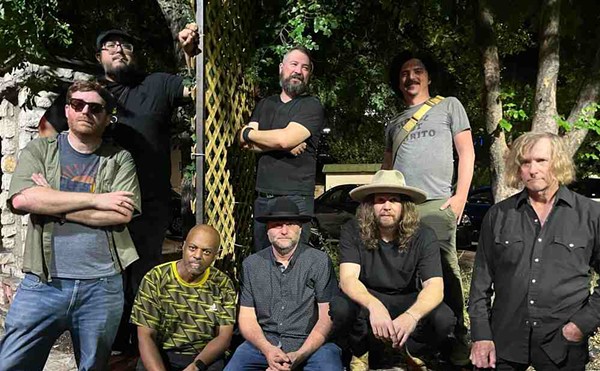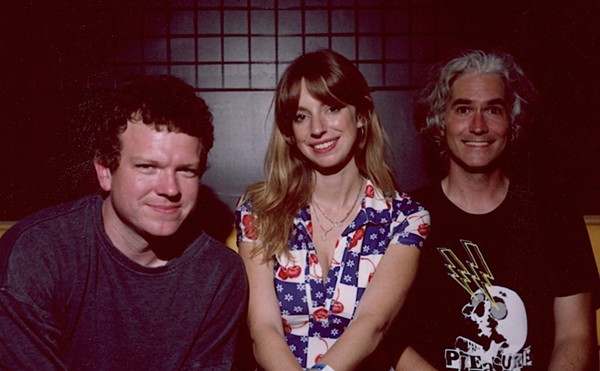“Feel Flows” made me a music nerd. I’d already developed a small-time obsession with the usual geek bands — the Replacements, the Velvet Underground, the Pixies — but the first time I heard Carl Wilson’s sleepy tenor reciting those poetic lyrics over alien jazz flute, I became all-out obsessed. Discovering that the Beach Boys, a band known to me as a novelty act responsible for all that goofy surfing crap and em-effing “Kokomo,” had a catalog full of freaky genius music (usually thanks to freaky genius Brian Wilson, but as in the case of “Feel Flows”, not always) was more surprising to me than finding out they’d recorded a song written by Charles Manson.
These seemingly disparate elements of the Beach Boys story — their original goofy hits, leader Brian Wilson’s developing musical genius and mental breakdown, and brother Dennis Wilson’s brief relationship with the Manson family – are all examined, though never reconciled, in The Beach Boys and the Satan, released last month by Zeit Media. Originally aired on German television as part of the Pop Odyssee series in 1997, and unavailable for more than a decade, The Satan begins with an unfocused look at the initial surf-rock culture, highlighting instrumental hits by Dick Dale and the Chantays for so long you wonder when the Satan, or for that matter even the Beach Boys, will enter the picture, but the documentary covers a surprising amount of ground in less than an hour, mostly thanks to a somewhat candid interview with Brian Wilson.
This interview, in which Wilson discusses his abusive father, his OCD recording process, psychedelic drugs and the eventual effects of all of them on his mind, along with the rarely shown footage from the original studio sessions from lost masterpiece Smile, is the main draw here for Beach Boys cultists. Wilson, though often awkward and never eloquent, is a fascinating screen presence, admitting to being intimidated by Phil Spector and the Beatles and even scared by some of his own songs. The only subjects he won’t discuss, it seems, are the devil and serial killers. Though the title and box artwork highlight the band’s connection with both Manson and the Church of Satan, Wilson’s interviews never broach the subjects. To compensate, the documentarians intercut his interview segments with sensationalistic clips of evil, offering a shallow summary of the band’s connection to Manson.
Dennis Wilson took a couple of the Manson girls home one night, opening the door for their self-proclaimed messiah, a charismatic ex-con looking for an entry to the record industry, to invite himself in. Dennis Wilson also introduced Manson to producer Terry Melcher, whose refusal to give Manson a recording contract may have spurred the Tate-LaBianca murders, which took place in the home of Roman Polanski and Sharon Tate, previously owned by Melcher.
The documentary never goes in-depth, even glossing over “Cease to Exist,” the Manson song the Boys rearranged and released under the title “Never Learn Not to Love,” for which Dennis took sole songwriting credit. (Surprisingly, this isn’t even one of the five creepiest Beach Boys songs. See below for more.) Unfortunately, Brian, who reveals he’s frightened of the Theremin in “Good Vibrations,” never discusses Manson at all, and, Dennis refused to talk about the murders up to his death in 1983. To compensate, the filmmakers play the Kevin Bacon game with Satan, using the Dennis’s tenuous connection to the killers as an excuse to showcase bloody full-color crime scene photographs, segments of the disturbing Kenneth Anger film Lucifer Rising, and clips of Charles Manson’s awful, awful music. •
Five creepy Beach Boys songs
“She’s Going Bald”
Smiley Smile
Wresting producer title from Brian Wilson, mentally quagmired in endless revisions of Smile, ironically resulted in some of the most unsettling, inaccessible songs of the Beach Boys career, and “She’s Going Bald” is maybe the most disturbing. Mike Love, infamously unsupportive of Brian’s experimentations, recut cooler “He Gives Speeches” as a horrifying tale of female hair loss featuring Chipmunkian vocal gimmicks.
“Windchimes”
Smiley Smile
Though Smile bootlegs reveal this to be an innocuous thematic piece with terrible lyrics, the reproduced effort slows the tempo to a deranged plod backed by struggling keys fit to soundtrack a masked slasher.
“Wonderful”
Smiley Smile
This celebration of innocence lost, composed in Brian Wilson’s living-room sandbox, quickly becomes a horror show, thanks to a funereal organ and an interlude in which the Boys mimic children playing by squealing and talking falsetto.
“Roller Skating Child”
Love You
Speaking of imitating adolescence, this song, which might’ve been a hit a decade earlier, becomes a creepy Lolita-like confession — a clearly middle-aged dude watching and worshiping the body of a teenage girl at a roller rink.
“Their Hearts Were Full of Spring”
Performed live at Ronald Reagan’s inauguration in 1985
This a capella gets a twisted subtext after Love introduces it as a tribute to the enduring love of Ron and Nancy, which Love claims serves as an inspiration for the entire country — when everybody knows Reagan’s heart was full of the blood of middle-class babies.
















